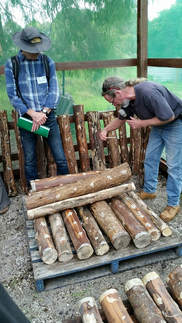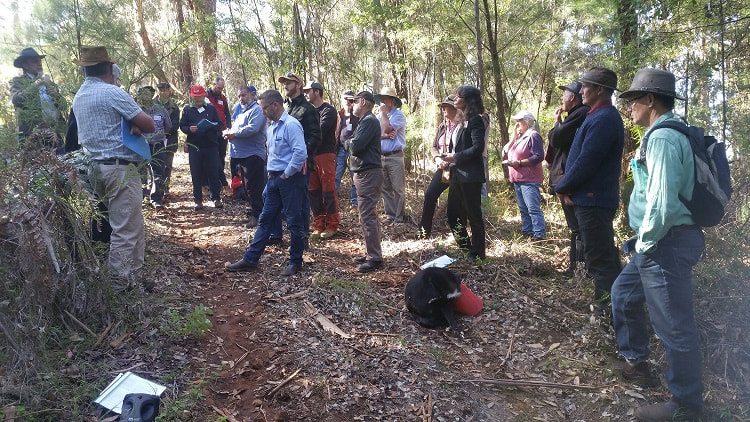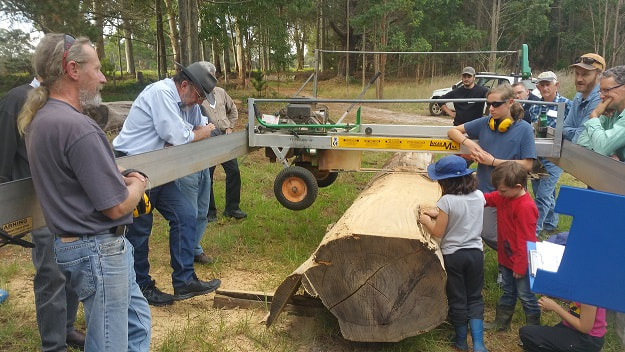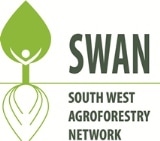Report by Richard Moore
 Julian explaining how he is growing shitake mushrooms on small eucalypt logs.
Julian explaining how he is growing shitake mushrooms on small eucalypt logs. “All the experience and knowledge that has come out in one day is great support for the people who are trying to grow trees and develop an industry out of it.”
This was how Peter Clifton, Regional Landcare Facilitator, summed up the recent field day run by the SW Agroforestry Network. The main topics covered during the day were fire, shitake mushrooms and the use and selling of thinnings.
The 35 people who attended the field day in the Pemberton district on a glorious day in early May visited two contrasting properties. Andrew Mountford of Mountford Wines showed us his patch of native karri forest. Like many landowners with native forest, Andrew values his forest and wants to look after it. He’s aware that it is overstocked and needs thinning. The challenge of finding markets for thinnings was explored in some depth - watch video - with participants sharing a range of perspectives and practical experience. It appears that thinning for export chips is probably the most feasible option at this time – not highly lucrative but costs should at least be covered.
Fire is the other major issue for Andrew, particularly as his house is located at the top of the hill above his karri forest. He outlined how he is reducing fuel levels using mild patchy burns. To view some of the discussion about Andrew’s forest go to YouTube.
Lunch at Big Brook Dam was a chance to catch up with friends and colleagues. It was also a chance to hear brief updates from some local groups working in the environmental scene; Kathy Dawson from the Warren Catchments Council on biochar (see video on YouTube), Jess Beckerling on the Forests for Life proposal and Bevan Eatts from the Southern Forests Food Council.
The afternoon’s program switched to a focus on planted trees. Julian Sharp, avid tree grower for more than 30 years, active mentor with the Mentoring Program run by SWAN and current Chair of the Warren Catchments Council, shared his experience with species for timber. A highlight was his latest venture – growing shitake mushrooms on small logs from his plantings of eucalypts (watch video on YouTube). For more on Julian’s story and some of the discussion see video on YouTube)
SWAN is grateful to the SW Catchments Council, for their support for the day via the Regional Landcare Facilitator Program. Feedback from participants suggests there was plenty of sharing and learning going on, which is essentially what such days are about. As Bridgetown tree grower, Peter Rydings said during the wrap-up session
“I think the experience and knowledge is widespread and people have been willing to share it. I think we’ve all taken some great advantage from that today. I hope we can in some way pass it onto others as well.”
by Richard Moore, ex-EO, South West Agroforestry Network
This was how Peter Clifton, Regional Landcare Facilitator, summed up the recent field day run by the SW Agroforestry Network. The main topics covered during the day were fire, shitake mushrooms and the use and selling of thinnings.
The 35 people who attended the field day in the Pemberton district on a glorious day in early May visited two contrasting properties. Andrew Mountford of Mountford Wines showed us his patch of native karri forest. Like many landowners with native forest, Andrew values his forest and wants to look after it. He’s aware that it is overstocked and needs thinning. The challenge of finding markets for thinnings was explored in some depth - watch video - with participants sharing a range of perspectives and practical experience. It appears that thinning for export chips is probably the most feasible option at this time – not highly lucrative but costs should at least be covered.
Fire is the other major issue for Andrew, particularly as his house is located at the top of the hill above his karri forest. He outlined how he is reducing fuel levels using mild patchy burns. To view some of the discussion about Andrew’s forest go to YouTube.
Lunch at Big Brook Dam was a chance to catch up with friends and colleagues. It was also a chance to hear brief updates from some local groups working in the environmental scene; Kathy Dawson from the Warren Catchments Council on biochar (see video on YouTube), Jess Beckerling on the Forests for Life proposal and Bevan Eatts from the Southern Forests Food Council.
The afternoon’s program switched to a focus on planted trees. Julian Sharp, avid tree grower for more than 30 years, active mentor with the Mentoring Program run by SWAN and current Chair of the Warren Catchments Council, shared his experience with species for timber. A highlight was his latest venture – growing shitake mushrooms on small logs from his plantings of eucalypts (watch video on YouTube). For more on Julian’s story and some of the discussion see video on YouTube)
SWAN is grateful to the SW Catchments Council, for their support for the day via the Regional Landcare Facilitator Program. Feedback from participants suggests there was plenty of sharing and learning going on, which is essentially what such days are about. As Bridgetown tree grower, Peter Rydings said during the wrap-up session
“I think the experience and knowledge is widespread and people have been willing to share it. I think we’ve all taken some great advantage from that today. I hope we can in some way pass it onto others as well.”
by Richard Moore, ex-EO, South West Agroforestry Network
RAchael Wedd's Perspective
 Field day attendees discussing Andrew Mountford’s karri forest
Field day attendees discussing Andrew Mountford’s karri forest What fabulous weather we were lucky to have for the SWAN field day down near Pemberton! With so many people attending with a range of experience and perspectives a good assortment of ideas and viewpoints were put forward throughout the day.. Participants included growers, industry reps, SWAN mentors and the local Greens MLC Diane Evers.
Starting in the karri regrowth forest at the Mountford Winery (did a few pre-lunch tastings happen? We're not telling!) people discussed management ideas (particularly fire management in this area and thinning needs) for this section of forest and potential marketing options.
Moving on to Big Brook Dam for lunch and a range of short talks we enjoyed hearing about local issues, biosecurity and feral animal management, land management issues and biochar. Ever heard about biochar and it's uses? Fascinating stuff.
The last stop was at Julian Sharp's property on the edge of the Warren National Park. We were there primarily to consider his mixed eucalypt plantation and small section of karri regrowth, but also ended up with a short but inspirational discussion on how to grow shiitake mushrooms in one of his sheds. While we were there, it was very interesting to note the Amanita muscaria (fly agaric or fairy mushrooms) growing there. These normally grow in and around pine plantations, but here they were very happily popping up in a eucalypt environment. These aren't native mushrooms by the way and please don't eat them (or pick them)!
This was the final field day that Richard Moore organised as he has a few things up his sleeve for the future - a very big thank you Richard for all your efforts!
Starting in the karri regrowth forest at the Mountford Winery (did a few pre-lunch tastings happen? We're not telling!) people discussed management ideas (particularly fire management in this area and thinning needs) for this section of forest and potential marketing options.
Moving on to Big Brook Dam for lunch and a range of short talks we enjoyed hearing about local issues, biosecurity and feral animal management, land management issues and biochar. Ever heard about biochar and it's uses? Fascinating stuff.
The last stop was at Julian Sharp's property on the edge of the Warren National Park. We were there primarily to consider his mixed eucalypt plantation and small section of karri regrowth, but also ended up with a short but inspirational discussion on how to grow shiitake mushrooms in one of his sheds. While we were there, it was very interesting to note the Amanita muscaria (fly agaric or fairy mushrooms) growing there. These normally grow in and around pine plantations, but here they were very happily popping up in a eucalypt environment. These aren't native mushrooms by the way and please don't eat them (or pick them)!
This was the final field day that Richard Moore organised as he has a few things up his sleeve for the future - a very big thank you Richard for all your efforts!

